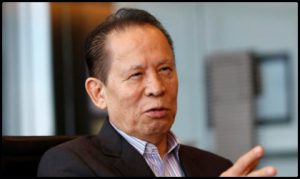
The gaming regulator for the Philippines has reportedly announced that it is to officially investigate yesterday’s alleged violent storming of the giant Okada Manila development by multiple representatives of Japanese billionaire businessman Kazuo Okada (pictured).
According to a report from the Reuters news service, the move from the Philippine Amusement and Gaming Corporation (PAGCor) comes after the 993-room Entertainment City venue was allegedly taken over by a group comprising 50 private security guards as well as local law enforcement officials. This faction was purportedly seeking to appropriate the venue on behalf of Okada after the Supreme Court of the Philippines ruled that the 79-year-old was once again entitled to lead its Tiger Resort Leisure and Entertainment Incorporated operator.
Extensive establishment:
Opened in December of 2015 by the Tiger Resort Leisure and Entertainment Incorporated subsidiary of Japanese pachinko and arcade games manufacturer Universal Entertainment Corporation, the 108-acre Okada Manila property is home to a 284,283 sq ft casino offering over 3,000 slots as well as some 500 gaming tables. The $2.4 billion development also plays host to the world’s largest multi-color dancing fountain alongside the Cove Manila indoor beach club, a luxury spa and a 90,510 sq ft shopping center.
Earlier exclusion:
Okada was reportedly angered in 2017 when he was expelled from the board of Manila-headquartered Tiger Resort Leisure and Entertainment Incorporated following allegations that the businessman had misappropriated around $3 million. However, the Osaka-born businessman celebrated last month when the Supreme Court of the Philippines purportedly ruled against this ousting and ordered the operator to reconstitute its pre-discharged executive team.
Pending plea:
Tiger Resort Leisure and Entertainment Incorporated subsequently appealed this decision and had reportedly refused to vacate its flagship property until a final ruling on its petition. The operator was purportedly furthermore said to be concerned about the ultimate future of its Okada Manila International Incorporated subsidiary after this arm went public in the United States last year via a $2.5 billion merger with blank-check firm 26 Capital Acquisition Corporation.
Alarming allegations:
Estrella Elamparo serves as legal counsel for Tiger Resort Leisure and Entertainment Incorporated and he reportedly told Inside Asian Gaming that the May 31 Okada Manila takeover had been ‘illegal and violent’ and had even involved the ‘kidnapping’ of Universal Entertainment Corporation director Hajime Tokuda. The attorney purportedly divulged to this source that the taking of the Philippines development ‘employing brute force and intimidation to compel key legitimate officers to vacate the premises’ was led by former board members Antonio ‘Tonyboy’ Cojuangco and Dindo Espeleta with help from lawyer Florencio Herrera III.
Reportedly read a statement from Elamparo…
“We are appalled at the blatant disregard of authority by the group of Mr Cojuangco. Without the necessary court order, they arrived with a private security group who forcibly carried the legitimate members of the Tiger Resort, Leisure and Entertainment Incorporated board out of the premises. This violence must be condemned and is a serious criminal offense. What they did to Mr Tokuda is no less than kidnapping. They are acting like hoodlums under the command of the sham board.”
Steward surprise:
For his part and the President of PAGCor, Alfredo Lim, reportedly told Reuters that the regulator is to meet later today in Manila to discuss just how it will be investigating the Okada Manila incident while ensuring that the mammoth facility maintains smooth operations.
Lim reportedly told the news service…
“I was shocked to read that there had been violence and intimidation.”
Gambling online in India refers to participating in online betting and casino games via websites or apps. The legal status of online gambling in India is somewhat complex and varies depending on the nature of the gambling and the specific state laws.
Many Indian players choose to use international online casinos and sportsbooks that operate legally in their home jurisdictions but may not be regulated under Indian law. These platforms are usually licensed by respected authorities.
Online gambling in India is not explicitly illegal, but its legality depends on state laws and the type of gambling activity. While international online casinos and sportsbooks cater to Indian players, the regulatory framework remains unclear, and players should exercise caution. It is always advisable to use licensed and reputable platforms to ensure a safe gambling experience.





